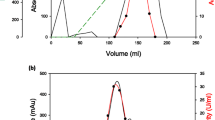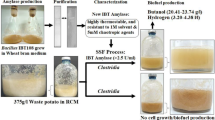Abstract
Bacillus acidicola TSAS1 produced a novel acid-stable, thermostable, Ca2+-independent and high maltose-forming α-amylase with optimum activity at pH 4.0 and 60°C, and T1/2 of 27 min at 90°C. The enzyme saccharified raw as well as soluble starches, and ameliorated bread quality when the dough was supplemented with the enzyme.



Similar content being viewed by others
References
Antranikian G (1992) Microbial degradation of starch. In: Winkelmann G (ed) Microbial degradation of natural products. Weinheim VCH, Germany, pp 27–56
Fogarty WM, Collins BS, Doyle EM, Kelly CT (1993) The high maltose-forming α-amylase of Saccharomonospora viridis: mechanisms of action. J Indust Microbiol 11:199–204
Gerrard JA, Every D, Sutton KH, Gilpin MJ (1997) The role of maltodextrins in the staling of bread. J Cereal Sci 26:201–209
Goesaert H, Leman P, Bijttebier A, Delcour JA (2009) Antifirming effects of starch degrading enzymes in bread crumb. J Agric Food Chem 57:2346–2355
Kanno M (1986) A Bacillus acidocaldarius α-amylase that is highly stable to heat under acidic conditions. Agric Biol Chem 50:23–31
Kumar P, Satyanarayana T (2008) Potential applications of microbial enzymes in improving quality and shelf-life of bakery products. In: Koutinas A, Pandey A, Larroche C (eds) Bioprocesses in food industry. Asiatech Publishers Inc, New Delhi, pp 132–146
Liu XD, Xu Y (2008) A novel raw starch digesting α-amylase from a newly isolated Bacillus sp. YX-1: purification and characterization. Biores Technol 99:4315–4320
Mamo G, Gessesse A (1999) Purification and characterization of two raw starch digesting thermostable α-amylases from a thermophilic Bacillus. Enz Microb Technol 25:433–438
McMahon HEM, Kelly CT, Fogarty WM (1999) High maltose producing amylolytic system of a Streptomyces sp. Biotechnol Lett 21:23–26
Rao JLUM, Satyanarayana T (2003) Statistical optimization of the high maltose-forming hyperthermostable and Ca2+ independent α-amylase production by an extreme thermophile Geobacillus thermoleovorans using response surface methodology. J Appl Microbiol 95:712–718
Rao JLUM, Satyanarayana T (2007) Improving production of hyperthermostable and high maltose-forming α-amylase by an extreme thermophile Geobacillus thermoleovorans using response surface methodology and its applications. Biores Technol 98:345–352
Sajedi RH, Naderi-Mahesh H, Khajeh K, Ahmadvand R, Ranjbar BA, Asoodeh A, Moradian F (2005) A calcium independent α-amylase that is active and stable at low pH from the Bacillus sp. KR-8104. Enz Microb Technol 36:666–671
Satyanarayana T, Noorwez SM, Kumar S, Rao JLUM, Ezhilvannan M, Kaur P (2004) Development of an ideal starch saccharification process using amylolytic enzymes from thermophiles. Biochem Soc Trans 32:276–278
Satyanarayana T, Rao JLUM, Ezhilvannan M (2005) α-Amylases. In: Pandey A, Webb C, Soccol CA, Larroche C (eds) Enzyme technology. Asiatech Publishers Inc, New-Delhi, pp 189–220
Shivaramakrishnan S, Gangadharan D, Nampoothiri KM, Soccol CR, Pandey A (2006) α-Amylases from microbial sources–an overview on recent developments. Food Technol Biotechnol 44:173–184
Acknowledgments
Authors gratefully acknowledge financial support from the Ministry of Environment and Forests, Government of India, New Delhi during the course of this investigation. Authors also thank Mr. Vijay Kumar Gupta (Tushar Nutritive Food Industry, New Delhi) for extending help in assessing the applicability of α-amylase in bread manufacture.
Author information
Authors and Affiliations
Corresponding author
Rights and permissions
About this article
Cite this article
Sharma, A., Satyanarayana, T. High maltose-forming, Ca2+-independent and acid stable α-amylase from a novel acidophilic bacterium, Bacillus acidicola . Biotechnol Lett 32, 1503–1507 (2010). https://doi.org/10.1007/s10529-010-0322-9
Received:
Accepted:
Published:
Issue Date:
DOI: https://doi.org/10.1007/s10529-010-0322-9




